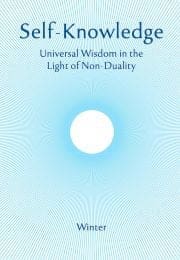Non-dual Meditation and Belief in God
What is the aim of our meditation? It is to expand our consciousness and to discover a fulfilment and security that nothing can disturb. On this path, much depends on our own ideas about ourselves and the great whole of which we are a part. When we think about these things and reflect on what the wisdom traditions tell us, we find ourselves considering what is sometimes called the supreme Being, or God. Whatever name, or names, we use, the deep-seated ideas we have about ultimate Reality affect our explorations in meditation. So I would like to begin by reflecting on the non-dual teachings about this supreme power or principle, which religions call God, and how these teachings can guide and support us on the way of inner discovery.
In non-duality, expressions, words or names equivalent to ‘God’ indicate ultimate reality, the highest truth. Such expressions refer to the totality of everything that exists, known from no particular point of view in time and space, but as the transcendental, absolute Reality. Or we can say that God is the existence in everything that exists.
This means that we have to be careful not to fall into confusion when we talk about this highest Truth. We cannot ask ‘what came before time?’ or ‘where is space located?’ Why not? Because such questions assume that the framework of time and space already exists. Similarly, there are many questions we cannot ask about God in the normal way. Can we say that God is the cause or creator of the world? We can only talk of causes when we divide things up and say that one thing led to another. If we think of the whole as being the totality of absolutely everything, obviously there are no real divisions, and so we cannot speak of causes or their creator.
Having said that, if we think of individual parts of the universe, including our body and mind, we can say that they have their support and origin in the absolute whole. So if we call the absolute whole ‘God’, then yes, clearly, in this relative sense, That is the source and sustainer of all the individuals. This means that what we may refer to as ‘God’ deserves the highest reverence and gratitude.
Yet we need to remember that no idea we have about this can be the complete and final truth. If we become rigid in our thinking, we may find ourselves dedicated, not to truth, but to a limited projection of our own mind.
One might say, ‘Well then, would it not be best to leave aside all such talk and avoid any discussion about ultimate reality, whatever we may call that?’ But this is not really an option. As thoughtful human beings we cannot say that the ultimate truth about everything is of no interest or importance. In order to think about what matters most and how to make the best of our lives, to hear and study teachings on wisdom, we need words, names and symbols. For true seekers these questions are of particular interest. Why is this so? It is because an important step to deeper knowledge is the willingness to question everything we think we know about ourselves and the world around us.
We may be surprised to find that however open-minded we consider ourselves to be, we do in fact harbour deeply held convictions about the nature of things, convictions that go beyond the evidence and the scope of reason. If we learn to become aware of these limitations in our thinking, then we open ourselves to the light of the non-dual teachings, and the heart of all the wisdom traditions.
Subscribe or enrol for free guest access to read all of this article and Self-Knowledge online.
Already subscribed or enrolled? Log in:


